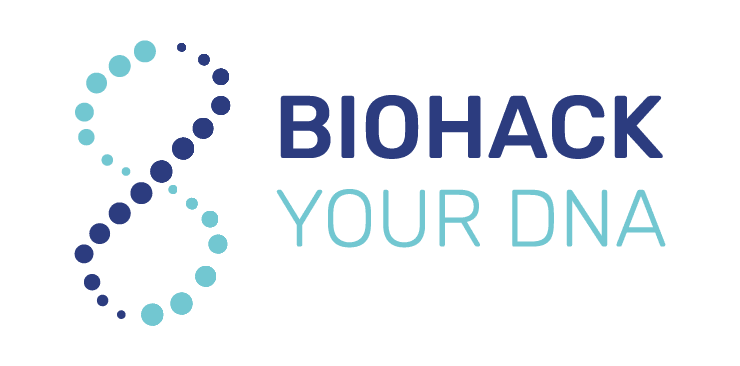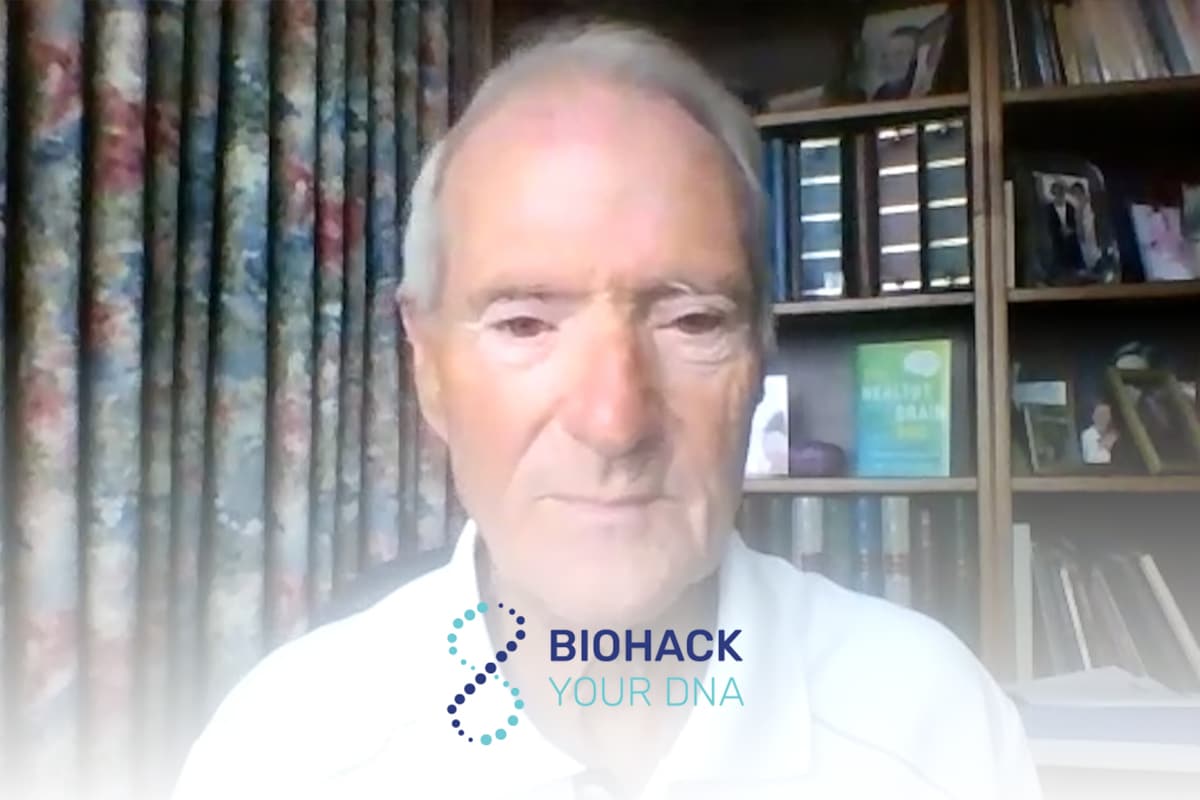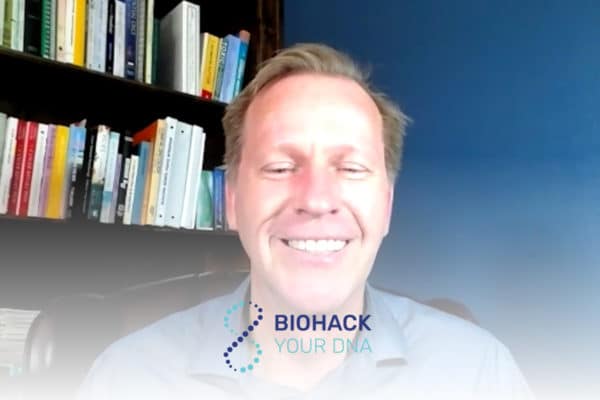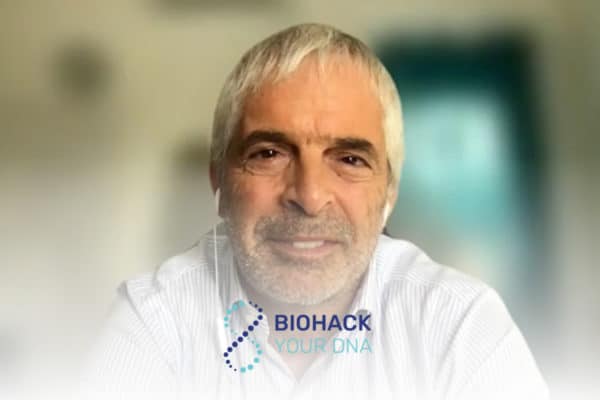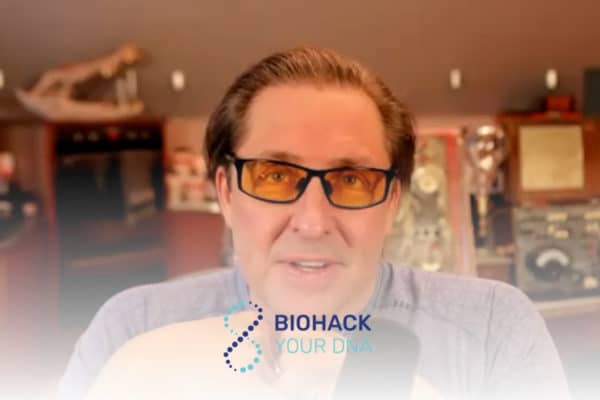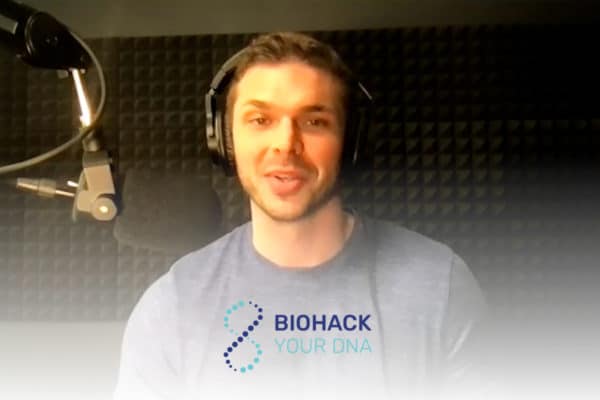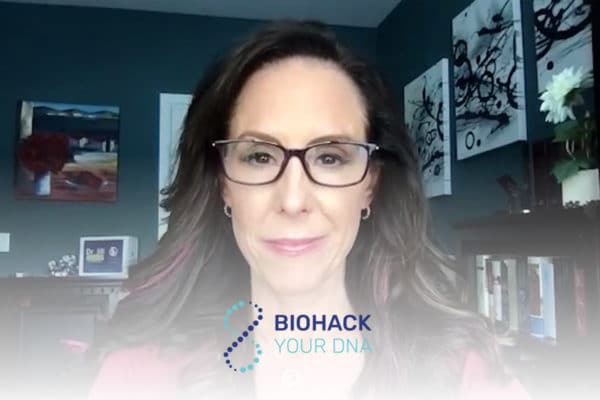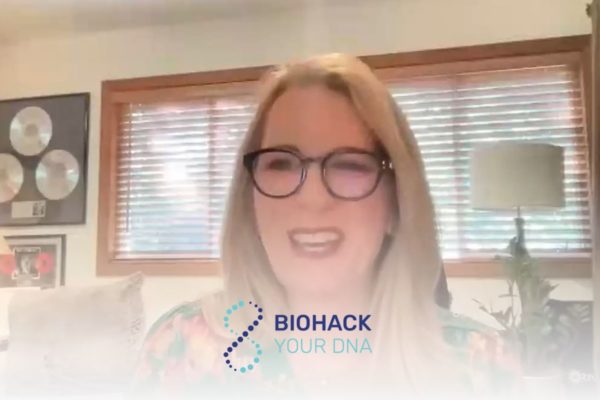Join the discussion below
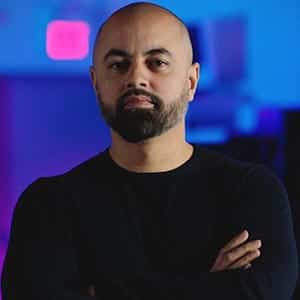
Kashif Khan is the Chief Executive Officer and Founder of The DNA Company, where personalized medicine is being pioneered through unique insights into the human genome. With the largest study of its kind globally, The DNA Company has developed a functional approach to genomic interpretation overlaying environment, nutrition, and lifestyle... Read More
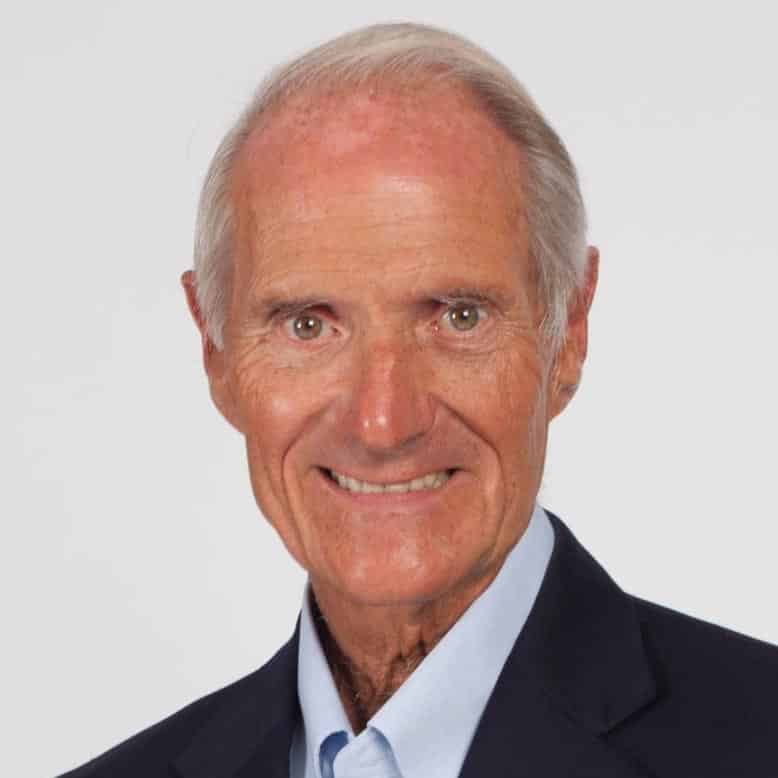
William Sears, MD, has been advising busy parents on how to raise healthier families for more than 50 years, and now has turned his attention to the specialty of lifestyle medicine. He is the co-founder of AskDrSears.com and the Dr. Sears Wellness Institute, which has certified over 12,000 Health Coaches... Read More
- Eat the 5-S cancer-healing diet
- How movement mobilizes your conquer-cancer immune system to fight better for you
- Sleep well – cancer less
- Open your internal pharmacy to make your own medicines
- How to have a conquer-cancer mindset
Kashif Khan
Hello, everyone. You know, when it comes to the work we do in genetics, two of the big questions we get asked are around Alzheimer’s, which we’ve addressed in a couple of the talks that we’ve had, but also around cancer. Just because there’s so much buzz around genetics and cancer and so much gap in information between why do we say there’s genetic issues, and why do these things express the way they do? I don’t think there’s anyone better to talk on the subject than who we have here today with us. And we’re honored to have Bill Sears with us. First of all, thank you for joining.
William Sears, M.D.
Thank you, Kashif, my honor to join.
Kashif Khan
Well, I mean, between the two of us, only one of us has been on the cover of Time Magazine. So it’s our honor, not yours. But first, we know-
William Sears, M.D.
And you know Kashif, you just tell me what you’d like to hear. I’ve been married for 56 years, so I take directions well. So you just tell me what to do.
Kashif Khan
That’s the only way to make it last. So, you know, firstly, there’s something that you talk about where you say that for you, you learn cancer as a “on the job experience” you know, school of hard knocks. So what do you mean by that?
William Sears, M.D.
Yes. Well, my experience with cancer: April 1997, an event that changed my life, for the better. I got that dreaded call, Bill you’ve got cancer.
Kashif Khan
Hmm.
William Sears, M.D.
Oh, it’s that call we hate to get.
Kashif Khan
Yeah.
William Sears, M.D.
But then, Kashif, cancer caused me to care. Cancer caused me to change. I had a lot to live for. I had 8 children, 11 grandchildren. So I decided to devote the rest of my life to cancer prevention and cancer healing. And 25 years later, after my cancer, I put it all in the book called Help Heal Yourself from Cancer.
Kashif Khan
Right.
William Sears, M.D.
And basically what I did is I made health, my hobby.
Kashif Khan
Hmm.
William Sears, M.D.
That was my change. I use the term transformation. I underwent a transformation, a transformation’s an inside job. Meaning the inside of me changed, for the better. So I made health, my hobby.
Kashif Khan
That is beautiful. The reason why I say that, because I resonate with it. Like I went through illness, which I talk about a lot, a few years ago, which is what drove me from being a sort of startup company, developing person to a healthcare innovator. And I do it cause I enjoy it so much. It’s really, every time you eat something, every time you purposefully remove something, every time you develop a new habit for the purpose of longevity and better health, and you actually derive pleasure and reward from it.
William Sears, M.D.
Yes. You know, just what you said is perfect. We have a whole section of the book. What you said is called the helpers high. I call it the helpers high.
Kashif Khan
Right.
William Sears, M.D.
In other words, that wonderful feeling you get.
Kashif Khan
Yeah.
William Sears, M.D.
By helping another person heal. And you and I are gonna go to bed tonight, drifting off to sleep with a high dose of the helpers high because maybe a hundred people, maybe a thousand people are better off and will prevent themselves from getting cancer and help themselves heal from cancer. So, I wish you a high dose of the helpers high tonight.
Kashif Khan
That’s incredible. And, that dopamine hit that you get, it could have been from a bag of potato chips or some kind of drink, you know, it’s the same benefit and feeling, but you’re just getting so much more purpose from it. So you talk about, like prevention is so much more realistic than people think, you know, it’s not wait and see. It’s like, no, let’s work on prevention. So how would you say, where do people start? Like what are five tips that you might tell people? Here’s what you need to do to prevent.
William Sears, M.D.
Well, hold up your hand.
Kashif Khan
Yeah.
William Sears, M.D.
Okay. You hold the five keys to your healing and prevention in your hand.
Kashif Khan
Okay.
William Sears, M.D.
First of all, believe you will heal.
Kashif Khan
Right.
William Sears, M.D.
The belief effect, we’re gonna talk about next. Secondly, move more, sit less, stay lean.
Kashif Khan
Yeah.
William Sears, M.D.
Third, eat the five S conquer cancer diet. Four, sleep cancer away. And five help others heal by sharing your information. Those are my five steps. And starting with the belief effect.
Kashif Khan
Okay.
William Sears, M.D.
So let’s imagine that you get that dreaded call. Kashif, you’ve got cancer.
Kashif Khan
Right.
William Sears, M.D.
Now, you have one or two avenues to take. One or two roads. You can go down the fear factor road; Oh my gosh, why me? What I shoulda, woulda. I should have listened to my mother, eat more fruit and vegetables or go outside and play, I shoulda. Or, you know which is what we learned from the pandemic not to do because you don’t make wise decisions when you’re thinking under the fear factor.
Kashif Khan
Right.
William Sears, M.D.
And there is no other disease in the whole body that requires smarter decision making than cancer. Your brain is your commander in chief of your conquer cancer army. So believe you will heal. So immediately, I do this in my book and in my counseling, I say immediately, reframe, take your mind. Take your mind off your cancer, what you have, and into your brain, what you can do.
Kashif Khan
Hmm.
William Sears, M.D.
Now picture, follow me closely. You have within your own body, a conquer cancer army. You have trillions of troops in your body,
Kashif Khan
Right.
William Sears, M.D.
To fight cancer. Conquer cancer army. So I want you to dwell on your army inside and not your cancer inside.
Kashif Khan
Hmm
William Sears, M.D.
So then I have little pictures in my office when I’m talking to them. And I say, now, first of all, picture your conquer cancer army troops. My favorite are called natural killer cells, NK cells. So I have a picture of, the kids love this. And pardon me if I talk a lot about kids Kash, but you know, we’re just you and I are just big kids anyway. So I have pictures of the NK cell, a big round cell, like a PAC-man.
Kashif Khan
Right.
William Sears, M.D.
With an NK on the helmet and picture what happens when a cancer cell develops, like we all have cancer cells in our body. We have trillions of cell turnovers every day. So one of those are gonna go bad, but the good news is we have our own conquer cancer army inside.
Kashif Khan
Right.
William Sears, M.D.
And so when a cancer cell occurs, picture that NK cell, that PAC-man with a helmet, NK cell, being drawn, magnetized like a magnet towards the cancer cell. It gloms onto the cancer cell and shoots and fires a biochemical dart into the cancer cell and blows it up.
Kashif Khan
Wow.
William Sears, M.D.
So right now, that’s going on in your body.
Kashif Khan
You just gamified cancer.
William Sears, M.D.
You’re blowing up your cancer cells. Now, as long as your army, see there’s that balance inside. As long as your army fights better for you and you have more troops fighting for you than you have cancer cells, you don’t get cancer. But when you have more cancer cells and you have a weaker army inside that, because you didn’t take care of it,
Kashif Khan
Mhm.
William Sears, M.D.
then you get cancer. And that’s, you know what we just talked about is how to partner with your doctor too. So we first of all, teach my patients to dwell on your cancer, cancer conquer army inside, you get to your first appointment with your cancer care provider, and you know Kashif, today’s cancer treatment is the best it’s ever been.
Kashif Khan
Right.
William Sears, M.D.
The chemo, the radiation therapy, the targeted therapy, it’s the best it’s ever been. But when you get into the doctor, the doctor may say, well you know your cancer that you have, you have a 20% chance of survival and you immediately stop him and say, stop him or her, say, doctor, I am a patient. I am a person.
Kashif Khan
Yeah.
William Sears, M.D.
I am a person, not a percentage. Please, can we not throw out those percentages anymore?
Kashif Khan
Yeah.
William Sears, M.D.
And then you say to the doctor, and besides that doctor I’m preloaded and he goes, hey, what’s that mean? That means that I am taking care of my conquer cancer army inside. And I take care of those natural killer cells and those natural killer cells tell me that if I believe in, as if a natural killer cell is talking to you, believe in me, Feed me well. Don’t stress me out. Move me more and rest me. And I’ll fight better for you. So I feel preloaded doctor and see the doctor’s thinking, hmm, this is a smart patient. Maybe we can not use such higher doses. And I had that experience of pre loading in my, I got a second cancer, four years ago. I was due for my checkup from my family doctor.
And I said, oh, I’m saying to my wife, oh honey, I feel fine. I don’t need to go for a checkup, I feel fine. And you know, when a woman looks at you with that alarming look. You wanna just say, yes dear. Honey go get your checkup. So I went in, check ups just fine. I get a call a day later, Bill got bad news, you’ve got leukemia. And I thought, wow, come on. But I’ve got good news for you because you are preloaded, because you are lean, I dropped a bunch of weight off my waist, because you’re lean, because you eat a good anti-cancer diet, because you get outside and play, like your mother said outdoor, because you do all those things, for you I believe we can use a lower dose of the safest medicine.
Kashif Khan
Right.
William Sears, M.D.
And at that time, four years ago, 55% of my white blood cells were cancerous. 55%!
Kashif Khan
Wow!
William Sears, M.D.
My white blood count was 10 times abnormal. Within a year and a half, My white blood count went back to normal, and my cancer cells essentially disappeared. Went from 55% to zero, zero, 1%, something like that.
Kashif Khan
Wow.
William Sears, M.D.
And that’s when I learned, Kashif that’s when I learned, the value of prevention and pre loading your body. So when stuff happens,
Kashif Khan
Yeah.
William Sears, M.D.
Our body says, okay, you’ve taken care of us. We’ll fight for you.
Kashif Khan
What you said is so interesting because, I mean I’m sure people caught it, but even what you refer to as prevention is different than what people believe. People believe prevention is, I will never get it. What you’re saying, prevention is also developing the resilience that if God forbid this happens, it’s not a big deal. You’re gonna cope with it because you’ve created the terrain, the environment for which it’s very easy to deal, as opposed to, yeah you’re gonna get it, and there’s two options. Get it in the ideal body type or get it in the worst body type where the cancer’s gonna thrive.
William Sears, M.D.
Yes, you mentioned magic word resilience.
Kashif Khan
Right?.
William Sears, M.D.
See, that’s the thing. That’s what we teach in our book, and our cancer course. What we teach in our book is, resilience means that you can bounce back. I’m going to dwell on how to keep my conquer cancer army inside fighting better for me. And I’m not gonna dwell on the cancer inside of me. That’s the resilience that we want people to get.
Kashif Khan
Yeah, and I’ve never thought about it the way you said where, you think about cancer and that becomes your focus, this thing that’s in me. But depending who you talk to, there’s somewhere between 30 to 70 trillion cells in your body.
William Sears, M.D.
Mhmm.
Kashif Khan
Why, like you said, why not focus on that extremely overwhelming volume of traffic versus this one, you know, jurisdictional, like it’s, it’s a lump here, right?
William Sears, M.D.
Yeah.
Kashif Khan
And you forgot about the other trillions of, like tens of trillions of cells, right?
William Sears, M.D.
Mhmm, yes.
Kashif Khan
And that thinking, just flipping it around on its head, makes it overwhelming. It makes you feel invincible.
William Sears, M.D.
Thinking, and that’s again, back to the brain, the CEO, the commander in chief of your immune system army, and what happens immediately, not immediately, but after over months, becomes automatic. Your thought process, will this food, thought, or action feed or fight my cancer? That becomes like an automatic every day, will this food fight? Will this food, thought, or action feed or fight my cancer?
Kashif Khan
Yeah.
William Sears, M.D.
And then you do it.
Kashif Khan
That’s amazing. And speaking of food, you talk about in your book, the five S cancer diet.
William Sears, M.D.
Mhm, yep.
Kashif Khan
So let’s dive into that.
William Sears, M.D.
Well the, the five S’s again, I like hand figures.
Kashif Khan
Yeah.
William Sears, M.D.
And so I’ll go through maybe a day in the life of how I, my anti-cancer eating.
Kashif Khan
Yeah.
William Sears, M.D.
So first of all, I have a big smoothie in the morning, my anti-cancer smoothie.
Kashif Khan
Wow.
William Sears, M.D.
You see that? And that thing on top is a fig.
Kashif Khan
Wow.
William Sears, M.D.
Because I have a sweet tooth.
Kashif Khan
Yeah.
William Sears, M.D.
And I just, so first of all, I have my anti-cancer smoothie in the morning, 15 ingredients!
Kashif Khan
Okay.
William Sears, M.D.
I just went online, I studied it carefully. I wanted to pick the 15 top foods that are anti-cancer and that’s my diet. And what’s interesting, even though I didn’t like it, I knew I didn’t like it. I said, what do I like? I like worse, getting cancer. So, and like chocolate, for example. I said, okay, I’m not gonna give up my chocolate.
Kashif Khan
Yeah.
William Sears, M.D.
So what I did is, I started, I used to get 55% cocoa, the real sweet stuff. And then what I’d do, I start with 55%. Next week, 60%, 65%, 70%. Then within a couple months, I’m eating 85%.
Kashif Khan
Right.
William Sears, M.D.
And I liked it. And then when I tried to eat the other chocolate, it was too sweet. So it’s that anti-cancer mindset. That conquer cancer mindset, you can shape your taste toward eating the foods and liking the foods. So the first of all is, a smoothie in the morning, a salad with spices in the evening, turmeric and black pepper in a nice big green salad.
Kashif Khan
Mhmm.
William Sears, M.D.
And then the third thing, salmon, the third S, salmon. A piece of wild, Alaskan salmon. A wild Pacific salmon, three times a week. But doctor, I don’t like fish, or I’m a vegan. All right. You learn to like it, or you can be a vegan and you can take a vegan algae source omega-3.
Kashif Khan
Right.
William Sears, M.D.
But you’ve gotta have that. And what really gets my patients in my office, why I say I have two pictures, I say, all right here’s a picture of your brain. And here are the top 10 nutrients in your brain. Here’s a picture of a piece of wild Pacific salmon.
Kashif Khan
Right.
William Sears, M.D.
Notice the same top 10 nutrients that in your brain, your commander in chief of your conquer cancer army.
Kashif Khan
Yeah.
William Sears, M.D.
The same top 10 nutrients are in your brain. They’re in the salmon. And they say, okay doctor, you’ve convinced me. And then the fourth S is smart snacking.
Kashif Khan
Hmm.
William Sears, M.D.
Smart snacking. And I call it my rule of twos. Eat twice as often, eat half as much.
Kashif Khan
Right.
William Sears, M.D.
Chew twice as long, and take twice the time to dine. And Kashif, we are a nation of gorgers.
Kashif Khan
Yeah.
William Sears, M.D.
And I have little pictures in my office, George the gorger and Gracie the grazer. And then I have a little sign and I say, which one is more likely to get cancer, George the gorger?
Kashif Khan
Yeah
William Sears, M.D.
Or Gracie the grazer? And boy, they get it. They get it. And then for the kids, you know constipation is a big, big colon cancer trigger.
Kashif Khan
Right.
William Sears, M.D.
Chronic constipation. And we are a constipated society.
Kashif Khan
Yeah.
William Sears, M.D.
Especially young kids. So for the young kids, I start ’em off. I say, okay, chew, chew times two. And then I say, the better you chew, the better you poo. And you know, the parents are laughing and smiling and blushing a little bit. And they’ll call me later, say, boy, that the better you chew, the better you poo Dr. Bill, thank you that got him to eat. In fact, we have a cute book called Dr. Poo.
Kashif Khan
Okay.
William Sears, M.D.
That you can order from Amazon, Dr. Poo. And it’s kind of a picture book taking children through their intestines to show them that. That, you know, the better you chew, the better you graze all that. And then the fifth S is supplements based on science. So that is, that is sort of my anti-cancer diet, Kashif. And basically it’s, it’s basically low in added sugar.
Kashif Khan
Yep.
William Sears, M.D.
When you see added sugar on the label, added sugars on your naughty list.
Kashif Khan
Right.
William Sears, M.D.
Because cancer cells love sugar. And I draw pictures of that for the kids and they get it. I say, picture that cancer cell looking at sugar, and it says, yum, you’re feeding me my favorite food. Oh, they get it. It also is high in fiber and antioxidants.
Kashif Khan
Right.
William Sears, M.D.
To fight it. It promotes leanness rather than obesity. Leanness doesn’t mean skinny. It means having the right percentage of body fat for your body type.
Kashif Khan
Right.
William Sears, M.D.
And if you listed, had to list the triggers of cancer, most cancers, obesity, abdominal obesity,
Kashif Khan
Right.
William Sears, M.D.
Would top the list. And that’s why when I see oftentimes, you know, wives will bring their husbands in and say, honey, I want you to listen to Dr. Bill. And, you know, nice gentleman comes in, but rather portly and with a big, abdominal pot belly. And I say to him, you know, Joe, the next time we meet, I wanna see less of you. And then I tell them where abdominal obesity is a huge, huge trigger for cancer. And so that’s sort of in a nutshell, your conquer cancer diet, that really helps.
Kashif Khan
And you mentioned supplements, what supplements are you taking?
William Sears, M.D.
Well, the omega-3.
Kashif Khan
Right.
William Sears, M.D.
I measure my omega-3 index, needs to be higher than 8. Vitamin D.
Kashif Khan
Right.
William Sears, M.D.
Fruit and vegetable supplement. I take one astaxanthin. But basically I eat, let’s see supplements, are in addition to foods.
Kashif Khan
Yeah.
William Sears, M.D.
So I sort of fill in the gaps with them. And then I guess, besides the anti-cancer diet, one of my biggest teachings is go outside and play.
Kashif Khan
Right.
William Sears, M.D.
Go outside and play. So Kashif again, I like to kind of imagine you’re coming into my office for cancer consultation. And I would say to you, you know, tell me Kashif, how many hours per day do you spend movement outside? How many hours a day do you spend moving outside? And you’re probably saying, what’s that got to do with my cancer? And it really does.
Kashif Khan
Yeah I think in your book, you talk about like, immobilizing your immune system through movement. You know?
William Sears, M.D.
Yes. That phrase you just mentioned, mobilize your immune system through movement.
Kashif Khan
Right.
William Sears, M.D.
I want our listeners to write down that. Movement mobilizes your immune system. So let me take you into what’s going on and just say, imagine you’re walking with friends someday, tomorrow or so. They’re having a nice brisk walk out in the sunshine and you say, oh, it feels so good to be mobilizing my immune system. And they’ll look at you and say what and say, what? But here’s what happens, I’m gonna take you deep inside your body now. You have trillions of white cells, those natural killer cells, white cells, and they’re like troops. They’re like soldiers stationed.
Kashif Khan
Mhm.
William Sears, M.D.
And if you were the great designer of the greatest machine ever made, the body mind, where do you think in your body you would put troops if you wanted to get them into the bloodstream the fastest to kill the cancer cells? Where do you think you put them?
Kashif Khan
I don’t know where the troops are.
William Sears, M.D.
How about the lining of your blood vessels?
Kashif Khan
That makes sense.
William Sears, M.D.
It makes sense, yes.
Kashif Khan
Yeah.
William Sears, M.D.
And I see that, I was waiting for you to say that makes sense, because when I’m talking to patients in my practice, when they say, oh, that makes sense, I know I’m getting through to them.
Kashif Khan
Yeah, yeah, yeah.
William Sears, M.D.
If they don’t, then I need to change the way I’m talking. So that makes sense. So let’s picture your blood vessel, have a mental picture of your blood vessel now. And the lining of your blood vessel, I call a silver lining. The on top of that lining, in that lining, are trillions of white blood cells.
Kashif Khan
Right.
William Sears, M.D.
Some of which are natural killer cells. Movement, what is called in medicine, demarginating. Movement, instructs those natural killer cells and the white cells to get off your sitting and get into the blood and go fight for me. So movement mobilizes your immune system, white blood cells to get into the bloodstream, circulate throughout your body and glom onto those cancer cells, fire a biochemical dart inside and blow ’em up. So that’s why Dr. Mom was so right when she said go outside and play.
Kashif Khan
Yeah.
William Sears, M.D.
And you know, Kashif, I learned this, I learned a lot about movement outdoors or green peace. I learned a lot about that when I was lecturing in Japan. I’ll never forget one day after a long lecture and Asian lectures are very long.
Kashif Khan
Okay.
William Sears, M.D.
And my mind was just fried. And so our host, Mr. Saganishi said, we’re gonna take you and Mrs. Sears out for some shinrin-yoku.
Kashif Khan
Hmm.
William Sears, M.D.
Shinrin-yoku, hmm. I thought it was a Japanese drink. And we get in his car and we drive up a mountain. And we stop and we get out and we take a walk in the woods. And he said, this is called in Japan, shinrin-Yoku, forest bathing, a walk in the woods. And I thought, you know, typical American, yeah, this sounds good. You know, all that. But I had to study this.
Kashif Khan
Yeah.
William Sears, M.D.
Because the Asian Japanese, in some ways, are way ahead of us in mind management techniques.
Kashif Khan
Yeah.
William Sears, M.D.
So I realized, there was a whole department in the university over there, department of forest bathing.
Kashif Khan
Wow.
William Sears, M.D.
Where they actually, they actually take, let’s imagine you were suffering from depression, anxiety. You just got the word, you got cancer. And you’re really in a funk, you can’t handle the cancer. They would take you out into the woods, in a forest. Wire you up with a lot of measurements, called windows to the brain, scans. They would take every fluid from your body and measure it. And after a half hour walk in the woods, your stress hormones go down.
Kashif Khan
Wow.
William Sears, M.D.
Your happy hormones go up. Your blood pressure stabilizes. Your natural killer cells go up in number and fighting ability.
Kashif Khan
Yeah.
William Sears, M.D.
From a good ol’ walk in the woods. So that’s why one of the biggest parts of our conquer cancer plan, is spend more time moving outdoors. And one of my favorite teachers on this, Dr. Eva Selhub, a neuroscientist at Harvard who wrote a beautiful book called Your Brain on Nature. I said, Eva, give me a phrase I can say in my office to sum it all up. And she told me, movement outdoors is exercise squared.
Kashif Khan
Wow. Wow.
William Sears, M.D.
See, so go outside and play.
Kashif Khan
It makes sense that even just bathing yourself in the woods, I don’t think there’s a better way to say it. Because the word bathing is like dipping yourself in water. So again, we’re re-engineering the meaning, which is you’re bathing not just, you know, literally what’s sensorially touching you, but it’s the whole experience, right? You’re bathing your soul. You’re bathing your mind.
William Sears, M.D.
Mhmm.
Kashif Khan
I’m sure, even what you’re breathing, you’re relieving your body of its detox capacity and the pollution of the city and all that type of thing. So there’s no other way to say it than bathing, ’cause you’re literally immersing yourself.
William Sears, M.D.
Yeah.
Kashif Khan
Head to toe. And the benefit you drive. I feel it, I love going onto the woods and hiking and you don’t know why, but you feel great when you do it.
William Sears, M.D.
Yeah you feel great, but that’s why. So your brain is changing.
Kashif Khan
Yeah.
William Sears, M.D.
The term, your brain on nature.
Kashif Khan
Yeah.
William Sears, M.D.
It’s really changing. And you mentioned the term swimming too and floating. And another thing I have in our book, I call it flotation therapy.
Kashif Khan
Hmm.
William Sears, M.D.
You’ve heard the term I’ll sleep on it. I said, I’ll swim on it too. So if you have access to a pool, it’s a wonderful, wonderful stress releaser. And I try this every morning. I go into a pool on a breaststroke.
Kashif Khan
Mhmm.
William Sears, M.D.
And I have a mantra, to just relax my mind. A mantra is just whatever, whatever, saying, or song or phrase that relaxes your mind. And you know, sometimes life sucks. It really does. But we all have a few things to be thankful for. So what I do in my flotation therapy, you can follow me for a minute. I get out there in the pool. I do it, the attitude of gratitude, flotation therapy exercise.
Kashif Khan
Hmm.
William Sears, M.D.
And it starts with, thank you God for my life, life 82 years. Thank you for my wife, 56 years.
Kashif Khan
Hmm.
William Sears, M.D.
Thank you for my health, cancer survivor times two. Thank you for my wealth, eight kids. Thank you for my MD. Please make it my ministry. And can you imagine what’s going on in your mind with that attitude of gratitude? So this is what, how I go to bed at night. And this is how I wake up in the morning with just a, choose your own mantra, pick the five things you like about yourself and all that. And develop that song or a rhythm that just calms your mind. Because again, with cancer, you need to have smart decision making. That brain needs smart decision making.
Kashif Khan
Well, you just described that, that piece and detaching yourselves from everything. That’s how our ancestors lived. You know, it sounds like such a luxury to be able to take 20 minutes, half an hour, whatever it is, and have that level of peace, to be able to focus on five things which are really wrapped up in the same thing. It’s your gratitude.
William Sears, M.D.
Yes. You mentioned the term ancestor, and we have a book called the Healthy Brain Book. This book, it’s the Healthy Brain Book. And there we go. And that is gonna be partnering with our Conquer Cancer book, and by the way, we donate all proceeds from the books. The Conquer Cancer book and the Brain Book to charity. But in there, we talk about, I think what the brain feels, you just mentioned term ancestors, when we go outside and play like that and communicate with nature. It’s like the brain says, oh, this is how I grew up. Welcome back.
Kashif Khan
Yeah, yeah. It’s that sense of your body’s constantly responding to whatever stimulus you’re experiencing. And if you’re telling your body things are good, time to thrive.
William Sears, M.D.
Mhmm.
Kashif Khan
Right, give me the energy I need. Give me the mental health I need. That’s what you’re gonna get.
William Sears, M.D.
Exactly, yes.
Kashif Khan
That’s beautiful, and you’re living proof of it. You do it every day.
William Sears, M.D.
Yeah.
Kashif Khan
There’s something else you said, which I think that people I can benefit from, which is open your internal pharmacy, you know?
William Sears, M.D.
Ah, yes.
Kashif Khan
Yeah. It just that even reading that, it blew my mind, but maybe you can dive into that.
William Sears, M.D.
Open your internal pharmacy. Well, Kashif, what you’re about to hear, what our listeners are about to hear, won the Nobel prize.
Kashif Khan
Hmm.
William Sears, M.D.
So years ago when I was making health, my hobby, I just knew that the great designer, the greatest machine ever made, our body mind, knew we were gonna mess it up, by the way we eat, think and live. So inside our body must be our own personal pharmacy. We must have a pharmacy to make our own medicines. So I started studying it. And my study took me to a friend up in UCLA, Dr. Louis Ignarro who won the Nobel Prize. And he, he was my mentor. He taught me. And I’m gonna do a mental picture now, that inside your blood vessels, picture your blood vessels. And along the lining of your blood vessels, I call it the silver lining, the term is endothelium. Along the lining of your blood vessels, you have trillions of microscopic medicine bottles. They look like little squirt bottles.
Kashif Khan
Yeah.
William Sears, M.D.
And they’ve discovered 23 medicines already in those little squirt bottles, your pharmacy. Medicines that lower the highs, high blood sugar, anti-cancer high blood pressure. High blood sugar, high blood pressure, high blood fats. They raise the lows, antidepressants. They mellow your moods, anti anxieties. They keep your blood from clotting too quickly, anticoagulants. So I just mentioned most of those anti’s that people take. But the medicines you make are better than the medicines you take because they come out at the right time, in the right dose, custom made, tailored just for you. And so that’s why in our Dr. Sears Wellness Institute, our main mantra we teach our main class, is make your own medicines. How to open your own pharmacy. And I’ll get a picture, you wanna have some fun tomorrow again. You’re walking with friends, oh, it feels so good to be opening my own pharmacy. And they’re going, what?
Kashif Khan
Hmm.
William Sears, M.D.
And this is what won the Nobel prize. That’s why movement, back to movement. What opens those medicine bottles and causes them to squirt these gases into the bloodstream of all these medicines, movement. When the blood flows faster, kind of follow me closely, when the blood flows faster over the tops of the medicine bottles, it creates a sheer force.
Kashif Khan
Mhmm.
William Sears, M.D.
Special force. That’s what won the Nobel prize. It creates a sheer force that opens the medicine bottles and causes them to squirt the medicines into your bloodstream.
Kashif Khan
Hmm.
William Sears, M.D.
So imagine during a walk or a swim or a dance, and I love dancing that’s one of my favorite movements, but any movement, just imagine I’m opening my pharmacy, I’m making my own medicine. Ah, see. So that’s why make your own medicines is one of the top teachings in our conquer cancer program.
Kashif Khan
I guess some people may ask the question, why is movement the trigger? You know, if you think about illness and age, there’s less movement. So is it speaking to, we need to prevent instead of treat, is that why that’s happening?
William Sears, M.D.
Yes, see, we’re a sitting society.
Kashif Khan
Yeah.
William Sears, M.D.
Especially the last few years. We’re sitting more and moving less.
Kashif Khan
Yeah.
William Sears, M.D.
And that one sentence, sitting more and moving less, Kashif, I believe that’s one of the biggest cancer triggers. And over the last few years, the incidence of type two diabetes has tripled in young people under the age 14. Cancers have gone up and mental unwellness, anxiety, depressions is skyrocketing.
Kashif Khan
Yeah.
William Sears, M.D.
See? So what’s interesting is all the conquer cancer tips that we’re talking about today are also the same tips that help conquer all many of these other diseases too.
Kashif Khan
Hmm that’s really, yeah.
William Sears, M.D.
And you know, like a good night’s sleep, even, is so important too.
Kashif Khan
Yeah, for sure. And everyone that we’ve been speaking to in terms of different areas we’ve been diving into with different levels of expertise, it always comes down to sleep.
William Sears, M.D.
Sleep, mhm.
Kashif Khan
One thing that we ignored for so long, but it doesn’t matter who you talk to who has had great outcomes. They will always say sleep is one of the main tools in their toolkit.
William Sears, M.D.
Yes, and I’m glad you mentioned that. Because sleep, let me take you into your brain to show you, and this is gonna be riveting. Show you what goes on during a good night’s sleep and why it helps conquer cancer. All right, three things are the top triggers of cancer, abdominal obesity, big around the waist, blood sugar spikes and a weakened conquer cancer army. It’s interesting that all three of those are improved during quality sleep.
Kashif Khan
Right?
William Sears, M.D.
So let’s center. I’m gonna take you into our bedroom for a minute. And as I walk into, I call it my sleep sanctuary. The door to our sleep sanctuary has wonderful photos of memories I want to have. And when I drift off to sleep, my body is resting, but my immune system army, my conquer cancer army, reports for night shift duty.
Kashif Khan
Right.
William Sears, M.D.
So just imagine as you’re drifting off to sleep, the army says, okay night shift, we’re coming on. And two things happen in the brain, well with quality sleep. There’s a group of cells called glia cells. Glia cells are your immune cells. We call it the garbage collectors of the brain.
Kashif Khan
Mhmm.
William Sears, M.D.
Now during the day, a lot of stuff accumulates. You know, toxic thoughts and stuff. So during quality sleep, the glia cells increase in number and garbage collecting. Like trillions of little garbage collecting trucks come out into your brain and collect the garbage, just stuff. Point number one. Then you have a lot of rivers throughout your brain called the lymphatic system.
Kashif Khan
Right.
William Sears, M.D.
The rivers out the brain. The rivers widen. So you have these garbage trucks collecting more garbage, dumping the garbage into these rivers and dumping them away.
Kashif Khan
Hmm.
William Sears, M.D.
So that’s the detox. I remember one time I went out to a party at a house and was going on too long and I was ready to go to bed. And I said, pardon me? I have an appointment with my detox specialist. They said, what? I said, yeah it’s 10 o’clock. And then I said, I’m going into detox. And they said, what’s going on? Just sleep. Sleep is detox.
Kashif Khan
Right.
William Sears, M.D.
So that’s what goes on with good old quality sleep, especially when you’re healing from cancer.
Kashif Khan
Yeah, it makes so much sense. When your body’s already struggling with so much, you don’t want that additional load of everything that happened during the day. Environmental chemicals, hormone issues, all the other stuff that needs to be cleared.
William Sears, M.D.
Yeah
Kashif Khan
Why have that extra load, if you’re struggling with that already. And then again, being in the state of resilience means every day allowing that detox and reset to happen, being prepared for the next day.
William Sears, M.D.
Oh yeah.
Kashif Khan
And that’s why you sleep. And for every day that you interrupt it, there’s a, another step in that threshold that you’ve gone up, that you can’t keep up with, right? It stockpiles, the garbage trucks didn’t do their job.
William Sears, M.D.
That’s right, you know, you just mentioned the term “prepares you for the next day”.
Kashif Khan
Right.
William Sears, M.D.
Yeah that’s what sleep does. Sleep pre loads you. Sleep pre loads your body mind. I use the term body mind, cause they’re all together. Sleep pre loads your body mind for the next day.
Kashif Khan
Yeah.
William Sears, M.D.
So when you wake up, you know, when you wake up, there’s an art to waking up.
Kashif Khan
Right.
William Sears, M.D.
To start the day right. First of all, drink up when you wake up because you’re dehydrated. So I have a little chamomile tea before I go to bed, and then I drink the rest of it when I wake up. Open the drapes, say hi to sky.
Kashif Khan
Yeah.
William Sears, M.D.
Ah, no cell phones yet.
Kashif Khan
Right.
William Sears, M.D.
No artificial screens. Hi to the sky, and then I do my attitude of gratitude. Five things, thank you for.
Kashif Khan
Right.
William Sears, M.D.
And my brain just says, bring on the day, bring on the day. I’m preloaded now.
Kashif Khan
That’s awesome. That is awesome. I’m gonna put that into practice. I feel like we could go on for a lot longer. I have to thank you for all that you’ve told us and taught us cause you’ve taken some stuff that is complex and made it so easy to apply. You know, you’ve truly taken the things that are the most actionable. Things that are, you’re not asking people to do a lot. These are, you know, just altering existing habits, right? You’re already eating, eat this way. You’re already sleeping, do it this way. So thank you. So how do people find the books? Because I’m sure people are gonna be interested in learning.
William Sears, M.D.
Yeah, it’ll be on Amazon.
Kashif Khan
Okay.
William Sears, M.D.
The Healthy Brain book will be on Amazon. Dr. Poo will be on Amazon. We also have our T Five Wellness Plan and The Help Heal Yourself from Cancer.
Kashif Khan
Okay.
William Sears, M.D.
And again, the proceeds are donated.
Kashif Khan
Yeah, that’s incredible. Cause not a lot of people do that, but you’re truly giving back.
William Sears, M.D.
Well this is our mission. And Kashif, you mentioned the term actionable.
Kashif Khan
Right.
William Sears, M.D.
See, my wish for our viewers is to go through these steps when you view this program.
Kashif Khan
Right?
William Sears, M.D.
First of all, replay it, watch it. You watch it for a few minutes, close your eyes and ponder it. Ponder means you replay what you just saw and read. And you let it sink in your brain and then you want to do it. You wanna personalize it.
Kashif Khan
Yeah.
William Sears, M.D.
Like our viewers will say, well you know, I like the five tips, but I can only do three. Okay, you personalize,
Kashif Khan
Yeah.
William Sears, M.D.
What you and I talked about. And then that becomes your personal conquer cancer program. You personalize it. And what I’m so happy about our program today Kashif, is again that helpers high.
Kashif Khan
Yeah.
William Sears, M.D.
You and I go to bed tonight, drifting off to sleep with that wonderful feeling.
Kashif Khan
Yeah.
William Sears, M.D.
That from the program, with which you all put together to summit, a lot of people are gonna be healthier and happier because of the program you put together, so thank you.
Kashif Khan
No, thank you. I mean, you can truly choose how you experience this world. You know, it can be a burden or it could be a big reward depending how you spend your time, and so. And thank you for joining us this incredible. Again, pleasure to have you here.
William Sears, M.D.
Thank you.
Downloads
